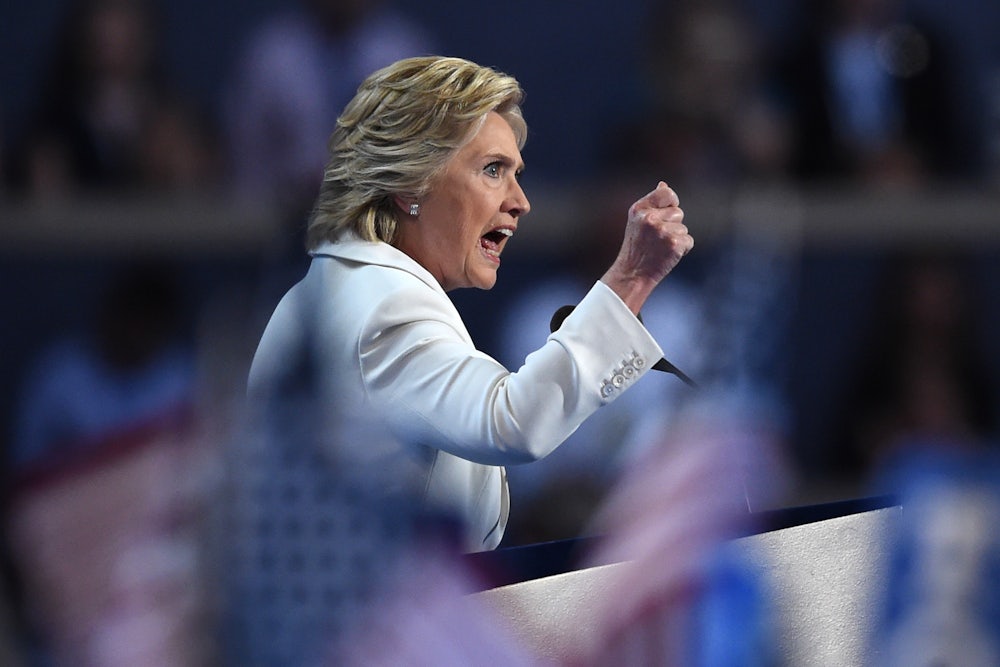If Hillary Clinton is to trounce Donald Trump—and trouncing him should be the aim—it won’t be because she’s a bravura orator, but because her campaign will marginalize him so effectively that her coalition will grow to dwarf his.
The question is how she intends to do it. What kind of campaign will she run? She answered that question Thursday night.
Trump is easy to beat in theory. An offensive, ignorant, greedy figure, he lacks any natural appeal among ethnic minorities and educated people; and while his superficial attractiveness to working class whites is obvious (he’s brash and racist, and speaks to their grievances) even mild scrutiny of his record and his agenda undermines the impression he likes to give that he’ll improve the lives of the disaffected.
But Trump is mercurial, and meretricious. Indeed the two qualities (if you can call them that) complement one another nicely. His wild swings of opinion and mood can be mistaken for authenticity and disinhibition; or perhaps they simply embody the blurry line between keeping it real and being erratic.
In any case, Trump’s character and indiscipline have confronted the Clinton campaign with a dilemma no campaign has ever faced: How the hell do you run against someone like that?
You can attack Trump as a bloodless billionaire, a nouveau-gauche Mitt Romney, who will subvert the interests of workers and the environment beneath those of the wealthy. An archetypal Republican, in other words. But that would conflict with the plainly hostile way Trump took over the party. Alternatively, you can attack Trump as temperamentally unfit demagogue in whom it would be dangerous to vest the power of the presidency. But there is an ad hominem quality to this attack that frees Trump to play tribune to the poor, and, more importantly, absolves the broader GOP for nominating and endorsing Trump’s racist candidacy.
This dilemma mirrors a debate that has played out in the past 24 hours, since President Barack Obama treated Trump as an aberration, rather than the apotheosis of modern Republicanism, in his Wednesday convention address.
“What we heard in Cleveland last week wasn’t particularly Republican,” Obama said, “and it sure wasn’t conservative.”
Contrast with Senate Minority Leader Harry Reid, who is at pains to portray Republican senators as a bunch of mini-Trumps, and Majority Leader Mitch McConnell as the Dr. Frankenstein of the Trumpian monster.
“The only thing Republicans like Mitch McConnell have accomplished,” Reid told the convention Wednesday, “is setting the stage for a hateful con-man, Donald Trump.”
These arguments are clearly in tension; and to the extent that they’re mutually exclusive, Clinton has placed herself squarely on Obama’s side. She compared our current crossroads to the one that faced American colonists who were divided over whether they were monarchists or revolutionaries. “America is once again at a moment of reckoning,” she said. “Powerful forces are threatening to pull us apart. Bonds of trust and respect are fraying. And just as with our founders, there are no guarantees. It truly is up to us. We have to decide whether we all will work together so we all can rise together.”
The implicit theme of the convention’s final night was that Americans shouldn’t see the election as a contest between Democrats and Republicans, but between responsible citizens and Donald Trump. Reagan Republicans and devout Muslims on one team; Donald Trump and Scott Baio and the sewer scavengers of right-wing talk radio on the other.
“A man you can bait with a tweet,” Clinton said in her peroration, “is not a man you can trust with nuclear weapons.” This is indisputable. But has Clinton chosen the most surefire way to keep them out of his hands?
This is a consequential question. In Obama’s thinking, erasing Republican and conservative culpability for Trump might make more of them feel comfortable voting for Clinton or abstaining, where tarring Republicans as Trump’s forbearers would forge their bond of common enemy.
That sounds like a great way to widen Clinton’s margin, but it doesn’t do much directly to help Democratic candidates in Reid’s domain of Congress who would benefit just as much if their Republican opponents were seen as Trumps-in-sheeps-clothing.
And the added insult is that, all strategic concerns aside, Reid has the better historical argument. Trump wasn’t incubated in the Senate Republican conference, but it beggars belief to imply that Trump was able to thrive in a party that did nothing to foster Trumpism. And the concern is that by failing to acknowledge the GOP’s role in enabling Trump, Democrats might win the presidency, but leave Clinton at the mercy of a Republican Congress.
The truth, though, is that this debate is unnecessarily binary. Elections are state-based as much as they are national, and there is nothing stopping the Clinton campaign, buffeted by Obama and her other top surrogates, from running an inclusive campaign, while Democratic congressional candidates drape their opponents’ Trump endorsements around their necks.
And the larger point is that coalitions aren’t normally built on unforgiving honesty. In an ideal world, Clinton would trounce Trump, extending her coattails all the way down the ballot, to capture Congress as well, leaving Republicans branded as the Trump party for a generation. That outcome is still possible, but it can’t be pursued in a way that makes the risk of defeat unacceptably high. Clinton’s primary imperative is to prevent Trump from winning, even narrowly, and that in turn means leaving a door ajar to Republicans who can’t reconcile themselves to Trump’s nomination.
Clinton showcased on Thursday night what a campaign like that looks like: a maximal coalition to defeat a maximal threat.
